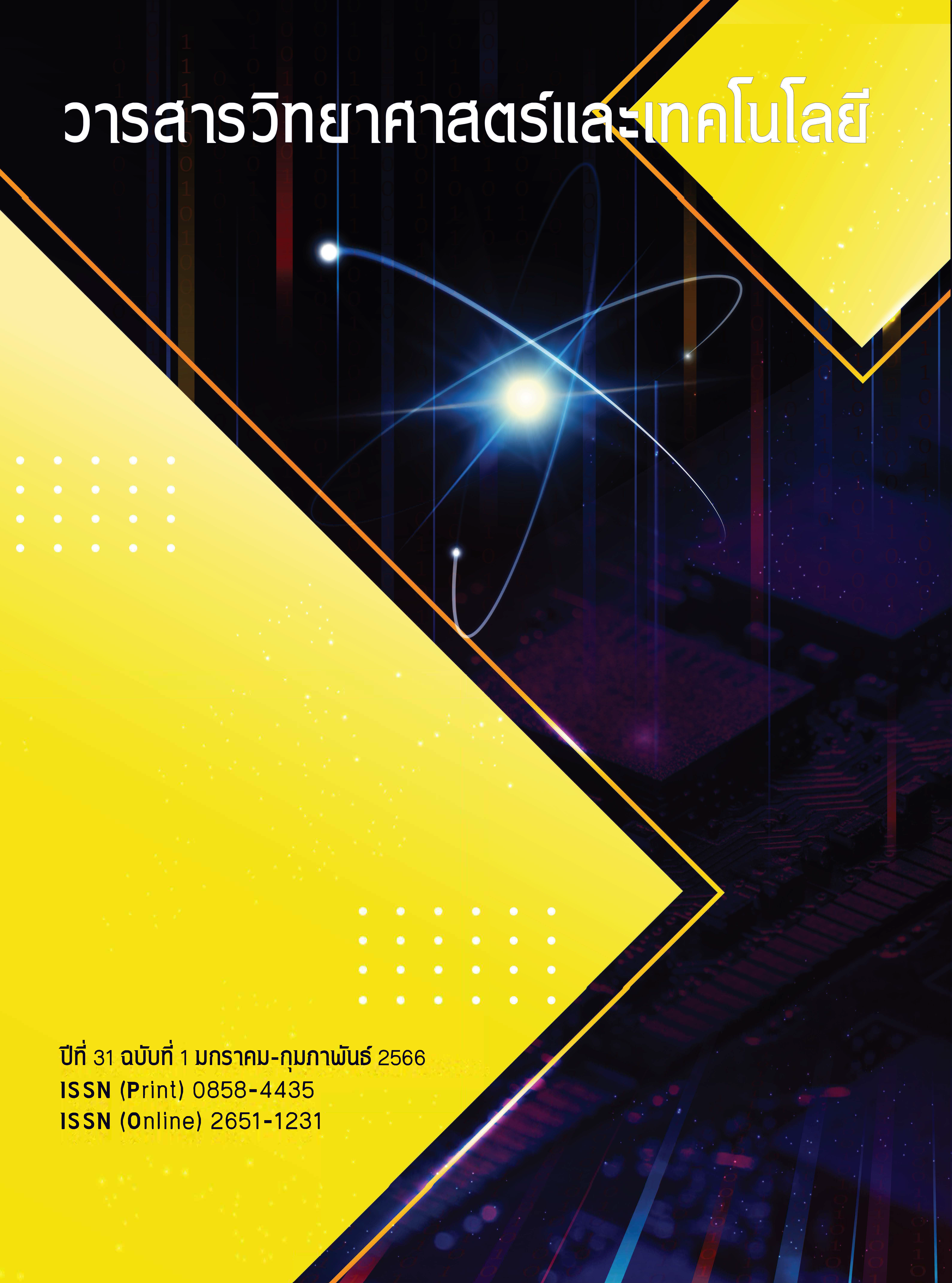Anti-proliferative and Cytotoxic Effects of Red Jasmine Rice Bran Extract on Hepatocellular Carcinoma
Main Article Content
Abstract
Liver cancer is one of the leading causes of Thai mortality. Previous studies have revealed that phenolics and flavonoids naturally found in medicinal herbs and dietary plants play an important role in cancer prevention and treatment. The study aimed to quantify the total phenolic and flavonoid contents in bran extract of a red jasmine rice variety, namely red jasmine, and to assess their anti-proliferative effect on liver cancer cells. The results showed that red jasmine bran extracted with 40% ethanol contained high total contents of phenolics and flavonoids (>100 mg/g extract). In addition, the extract exerted anti-proliferative and cytotoxic effects selectively on the HepG2 liver cancer cell line with an IC50 of 138.06 μg/mL. In contrast, this extract was not toxic to the BNL CL2 normal liver cell line with a higher IC50 of 280.39 μg/mL. These selective antiproliferative and cytotoxic effects of red jasmine bran extract on HepG2 cells increased in a dose and time-dependent manner.
Article Details
References
Sung, H., Ferlay, J., Siegel, R. L., Laversanne, M., Soerjomataram, I., Jemal, A., & Bray, F., 2021, Global Cancer Statistics 2020: GLOBOCAN Estimates of Incidence and Mortality Worldwide for 36 Cancers in 185 Countries. CA: A Cancer Journal for Clinicians, 71(3), 209-249.
World Health Organization, Global Cancer Statistics 2020 : GLOBOCAN Estimates of Incidence and Mortality in Thailand, Available Source: https://gco.iarc.fr/today/data/factsheets/populations/764-thailand-fact-sheets.pdf, February 18, 2021.
Daher, S., Massarwa, M., Benson, A. A., & Khoury, T., 2018, Current and Future Treatment of Hepatocellular Carcinoma: An Updated Comprehensive Review. J Clin Transl Hepatol, 6(1), 69-78.
Upadhyay, R., 2018, Plant pigments as dietary anticancer agents. International Journal of Green Pharmacy, 12.
Samyor, D., Das, A. B., & Deka, S. C., 2017, Pigmented rice a potential source of bioactive compounds: a review. International Journal of Food Science & Technology, 52(5), 1073-1081.
Tan, B. L., & Norhaizan, M. E., 2017, Scientific Evidence of Rice By-Products for Cancer Prevention: Chemopreventive Properties of Waste Products from Rice Milling on Carcinogenesis In vitro and In vivo. Biomed Res Int, 2017, 9017902.
Verma, D. K., & Srivastav, P. P., 2020, Bioactive compounds of rice (Oryza sativa L.): Review on paradigm and its potential benefit in human health. Trends in Food Science & Technology, 97, 355-365.
Junmarkho, K., & Hansakul, P., 2019, Thai pigmented rice bran extracts inhibit production of superoxide, nitric oxide radicals and inducible nitric oxide synthase in cellular models. Asian Pacific Journal of Tropical Biomedicine, 9, 291.
Junmarkho, K., 2019, Anti-oxidant and cellular protective effects of Thai purple and red rice bran extracts against oxidative stress for development of healthy instant powered beverage, Master Thesis, Thammasat University, Prathum Thani, 62 p.
Wang, Z., Li, Z., Ye, Y., Xie, L., & Li, W., 2016, Oxidative Stress and Liver Cancer: Etiology and Therapeutic Targets. Oxid Med Cell Longev, 2016, 7891574.
Fu, Y., & Chung, F. L., 2018, Oxidative stress and hepatocarcinogenesis. Hepatoma Res, 4.
Pintha, K., Yodkeeree, S., Pitchakarn, P., & Limtrakul, P., 2014, Anti-invasive activity against cancer cells of phytochemicals in red jasmine rice (Oryza sativa L.). Asian Pac J Cancer Prev, 15(11), 4601-4607.
Baek, J.-A., Chung, N.-J., Choi, K.-C., Hwang, J.-M., & Lee, J.-C., 2015, Hull extracts from pigmented rice exert antioxidant effects associated with total flavonoid contents and induce apoptosis in human cancer cells. Food Science and Biotechnology, 24(1), 241-247.
Chen, M. H., Choi, S. H., Kozukue, N., Kim, H. J., & Friedman, M., 2012, Growth-inhibitory effects of pigmented rice bran extracts and three red bran fractions against human cancer cells: relationships with composition and antioxidative activities. J Agric Food Chem, 60(36), 9151-9161.
Anantharaju, P. G., Gowda, P. C., Vimalambike, M. G., & Madhunapantula, S. V., 2016, An overview on the role of dietary phenolics for the treatment of cancers. Nutrition Journal, 15(1), 99.
Kumar, S., & Pandey, A. K., 2013, Chemistry and Biological Activities of Flavonoids: An Overview. The Scientific World Journal, 2013, 162750.
Abotaleb, M., Liskova, A., Kubatka, P., & Büsselberg, D., 2020, Therapeutic Potential of Plant Phenolic Acids in the Treatment of Cancer. Biomolecules, 10(2).
Abotaleb, M., Samuel, S. M., Varghese, E., Varghese, S., Kubatka, P., Liskova, A., & Büsselberg, D., 2018, Flavonoids in Cancer and Apoptosis. Cancers (Basel), 11(1).


